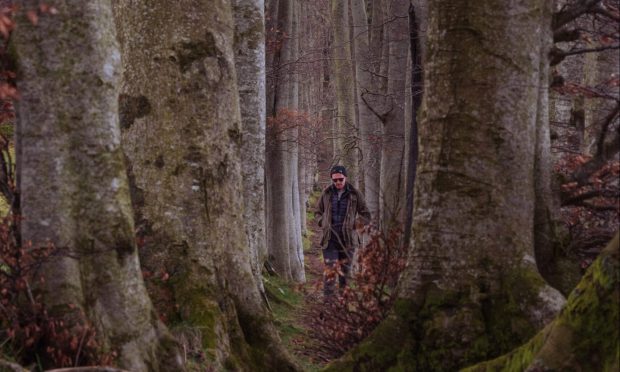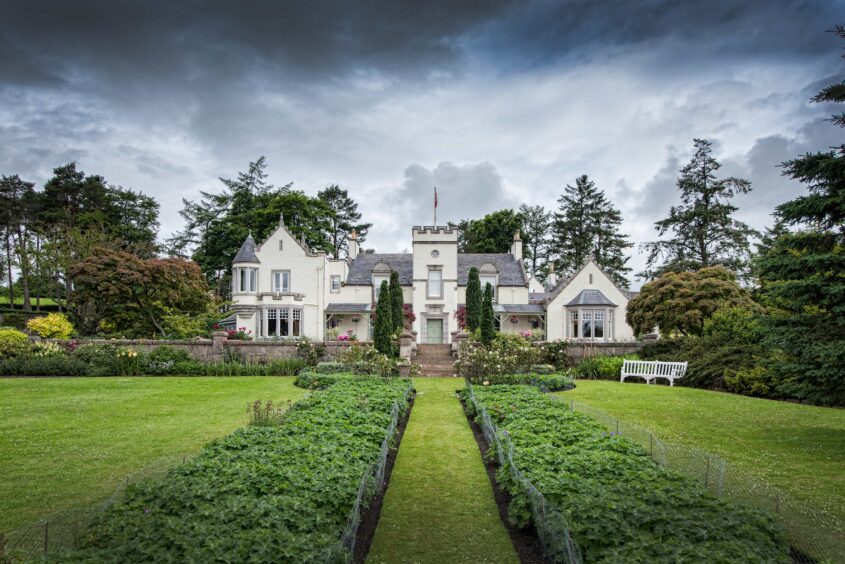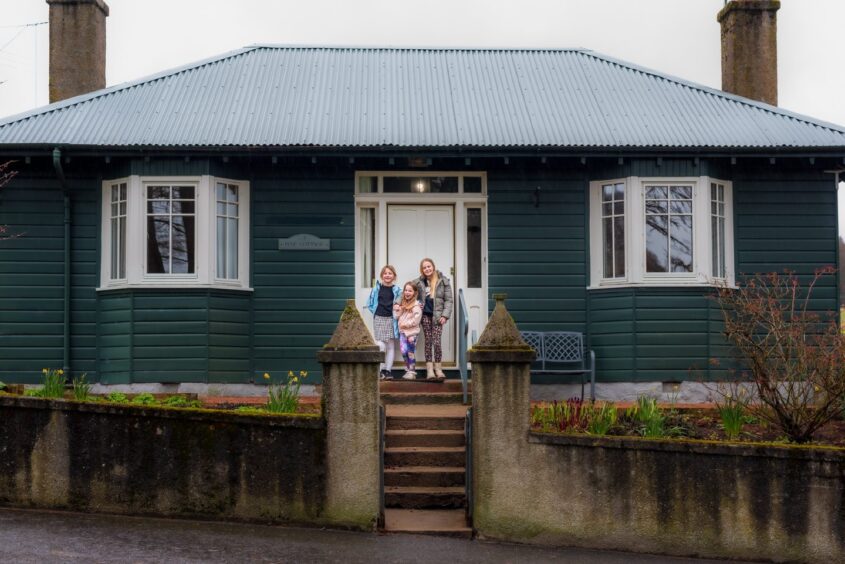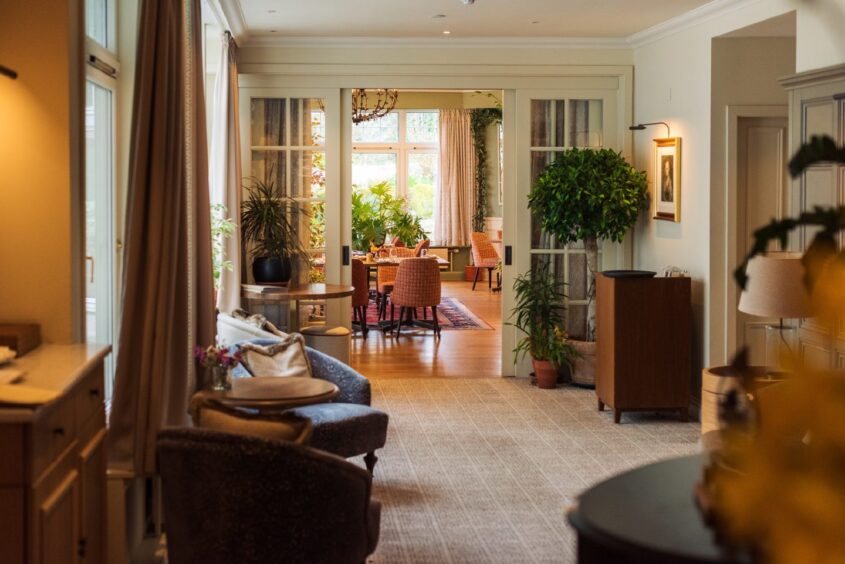
As the road twists away from Glenshee ski centre and down into the valley that skirts the Cairngorms National Park, ancient trees begin to sprout up along the roadside.
We are entering Royal Deeside, a beautiful and heavily wooded landscape that is home to Crathie Kirk, much loved by the late Queen, and Balmoral Castle. Driving deeper into this unspoilt part of the country is like going back through time.
The pace of life seems to slow the farther we go. My two daughters, my niece and I are staying at Douneside House, a country house hotel set within 17 acres of mature gardens, and, like the ancient trees that surround the property, Douneside has deep roots. What becomes clear is Douneside’s history of providing a place to rest and recuperate cocooned in the natural beauty of the landscape.
First, let’s step back. The main house is a listed building that dates back to 1888 when it was the holiday home of the MacRobert family. During the early 1900s, the family added extra rooms and a tower, transforming the property into a spectacular country house.
It was a bucolic setting for the MacRoberts – Lady Rachel and Sir Alexander, who had three sons, Alasdair, Roderic and Iain. Sadly, disaster struck when, in just three short years between 1938-41, all three sons, two of whom were RAF pilots, died in aircraft accidents. It was a triple tragedy that would have broken many parents but Lady MacRobert’s response gives evidence to her indomitable spirit.
On hearing of the loss of her sons, she made a donation of £25,000 (an incredible amount of money then) to purchase a bomber for the RAF. She asked that it be named MacRobert’s Reply. The bomber was a Stirling for XV Squadron, a small model of which can be seen today in the garden at Douneside. This was the start of a tradition that the RAF has kept alive, with a succession of its aircraft carrying the MacRobert name.
It is upon that background that Douneside became what it is today. Lady MacRobert left Douneside to the MacRobert Trust and, until relatively recently, the property was used almost exclusively as a retreat for commissioned officers.
That military connection continues today and while nowadays the hotel is open to the public, the link to our forces is evident everywhere.
No moreso than at our first port of call – the hotel health club. There, recuperating service men and women still make use of the ultra-modern facilities alongside guests and locals.
It’s no wonder the facilities are well loved, as the gym is excellent, and Douneside offers significant discounts on health club membership to serving and former military personnel. It’s an envious proposition to us non-military folk because the swimming pool is fantastic, beautifully warm and inviting, while there is also a small sauna and Jacuzzi.
We are staying at the pretty Pine Cottage, a two-bedroom bungalow painted in forest green. The bedrooms are painted in soft whites with plump bedlinen and resemble a picture-perfect Beatrix Potter book. In the living room, a wood burner is prepped with logs ready for a cosy night in.
A few steps away, a burbling stream runs away from the main house in Douneside’s beautiful gardens. We follow it to the edge of the property, where we find the most magical tree-lined walk that takes us in a loop, through the nearby woods and back to the hotel. Our boots sink into the muddy tracks along the way and, like a tree extracting water from the soil, I can almost feel calm being drawn up from the Deeside earth.
Back at the hotel, we arrive just in time for tea and cake – a little treat Douneside provides each day. After our walk in the chilly air, the table of cakes and steaming hot tea is fantastic.
The military connections continue the next day when we meet former Army commando Pip Delamere-Wright from Knockiehill Woodland Centre, who is taking us on a foraging and woodcraft course. Pip leads us on a tour of the gardens, explaining which plants are edible, which are great for medicinal uses and how to collect fire kindling from reeds. We arrive at a small wooden garden room where we make pine tea with the needles we have collected and, much to their delight, the children learn how to light a fire with a metal firestarter.
Later, we visit Ranna Farm, a few hundred metres up the road from Douneside. There, farmer Kirsty Williams shows us round the working farm and allows the children to feed the spring lambs, while baby piglets career round their pens and between our legs, much to the kids’ delight – and occasional terror.
After a busy day, we are ready for dinner at Douneside. The restaurant is in a charming conservatory, with large windows allowing the late-evening light to pour in. Dinner is of the highest calibre, full of locally sourced food and drinks while the staff are extremely attentive and patient, happy to share their knowledge of the food and drink and of the hotel’s fascinating history.
There are so many great places nearby to explore but we are more than happy to retire to Pine Cottage, where the log burner is blazing. We eat nibbles and have a movie night while snuggling up on the couch.
If relaxation and recuperation is the stated aim at Douneside, it’s safe to say that it is mission accomplished.
P.S. Beech Tree Avenue on the The MacRobert Estate at Douneside, is a stunning tree-lined walk that will take you on a loop from the house and out into the gorgeous Aberdeenshire countryside. A favourite of landscape photographers, this is one not to be missed.
Factfile
Pine Cottage starts from £240 per night. This includes complimentary access to the Health Club and a round at the local golf club. Guests who stay in Douneside’s holiday cottages can choose to dine in their on-site conservatory or library restaurant or to self-cater completely. For more information and to book, visit dounesidehouse.co.uk
For more on foraging and woodcraft experiences, visit Knockiehill Woodland Centre
Ranna Farm is part of the MacRobert Trust, visit www.themacroberttrust.org.uk for more information.

Enjoy the convenience of having The Sunday Post delivered as a digital ePaper straight to your smartphone, tablet or computer.
Subscribe for only £5.49 a month and enjoy all the benefits of the printed paper as a digital replica.
Subscribe

